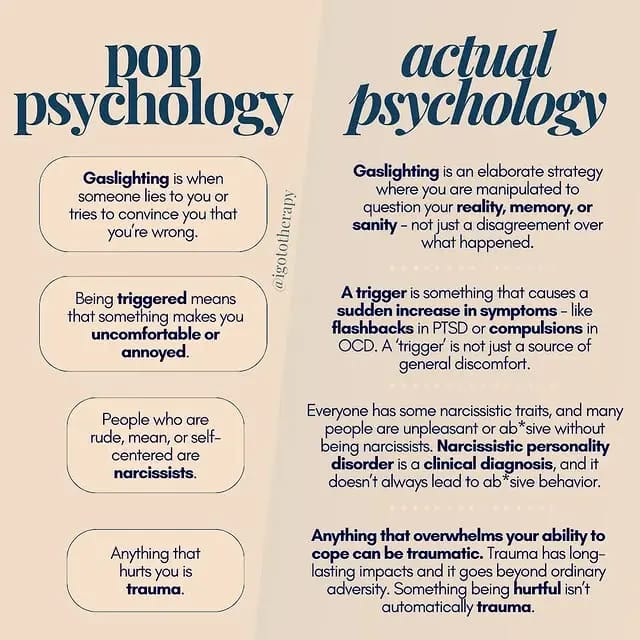This week 🗓️
🧩 Therapy Culture Gets a Reality Check
🧩 What’s happening:
Therapy culture dominates social feeds and talk shows. Critics argue it’s become identity, pathologizing everyday life. According to The Guardian (Mar 2025), experts are questioning whether mental health awareness has gone too far — contributing to overdiagnosis and blurring the line between distress and disorder.
💬 Why it matters for therapists:
Clients often arrive fluent in pop-psychology but lacking nuance. Therapists can help translate hashtags into insight, not diagnosis, and guide clients toward a balanced understanding of emotional language.
🪞 How it may show up in the room:
Clients labeling everyday stress as “trauma.”
Diagnostic identity shaping self-perception.
“Therapy-speak” becoming emotional armor.
🛠️ What therapists can do:
Reframe diagnostic labels as tools, not truths.
Normalize curiosity and flexibility.
Discuss “therapy culture” as a cultural force, not a flaw.
🔗 Go deeper:
💡 The bottom line:
Therapy culture isn’t the problem — oversimplifying it is.
🤖 AI, Apps & the New Digital Self
🧩 What’s happening:
AI therapy tools are multiplying — from journaling bots to voice-based coaches. A 2021 survey found 22% of U.S. adults have used a mental health chatbot, and more recent numbers suggest that number is rising. These tools expand access but can flatten empathy.
💬 Why it matters for therapists:
As clients bring digital reflections into sessions, therapists must navigate privacy, ethics, and the limits of algorithmic empathy.
🪞 How it may show up in the room:
Clients quoting AI-generated “insights.”
Anxiety about data sharing and confidentiality.
Comparing human vs algorithmic care (“the bot listens better than my partner”).
🛠️ What therapists can do:
Discuss AI’s limits openly.
Emphasize human empathy as irreplaceable.
Explore digital tools as supplements — not substitutes.
🔗 Go deeper:
💡 The bottom line:
AI can assist reflection — not replace the therapeutic relationship.
🎤 Taylor Swift’s New Era: Pop as Collective Processing
🧩 What’s happening:
Taylor Swift’s The Life of a Showgirl sold 2.7 million copies in one day, the biggest first-day release in U.S. history. Fans unpack lyrics and symbolism as communal therapy.
💬 Why it matters for therapists:
Celebrity narratives act as scaffolding for emotional processing. Pop culture now serves as a shared language for grief, growth, and meaning-making.
🪞 How it may show up in the room:
Clients identify with breakup or resilience themes.
Emotional comparison: “If she healed, why haven’t I?”
Lyrics used as mirrors for self-reflection.
🛠️ What therapists can do:
Explore which lyrics resonate and why.
Use music as metaphor for narrative re-authoring.
Normalize differing healing timelines.
🔗 Go deeper:
💡 The bottom line:
Pop culture can mirror healing — or trap us in comparison.
💼 Corporate Mindfulness Falls Short
🧩 What’s happening:
Over 50 % of U.S. employers now offer mindfulness or wellness programs, per Harvard Business Review. Yet when imposed without culture alignment, these initiatives can increase stress instead of reducing it.
💬 Why it matters for therapists:
Clients may feel torn between genuine care and performative wellness expectations. Burnout is often reframed as a personal failure rather than an organizational issue.
🪞 How it may show up in the room:
Guilt for skipping “wellness” sessions.
Cynicism about “toxic positivity.”
Conflict between exhaustion and required optimism.
🛠️ What therapists can do:
Validate burnout as systemic, not moral.
Redefine mindfulness as autonomy, not compliance.
Encourage self-care that feels real, not rehearsed.
🔗 Go deeper:
💡 The bottom line:
Mindfulness helps when it’s chosen — not required.
Thank you for reading!
I’m glad you’re here. If you have thoughts or feedback to share, my inbox is open: [email protected].
Like what you’re seeing? Please share with others in the field! You can help this newsletter grow into something great for the community.
Share this link 👉 https://www.nexanewsletter.com/subscribe
Preview image "I used to have Super Human Powers" by Esparta is licensed under CC BY 2.0.


